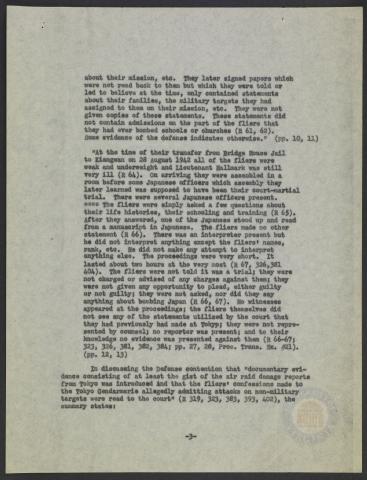
Page 3
| Parent | Circumstances surrounding the "confessions" of the Doolittle flyers |
|---|---|
| Date | 16 September 1947 |
| Language | English |
| Collection | Tavenner Papers & IMTFE Official Records |
| Box | Box 5 |
| Folder | General Memoranda and Reports from September 1947 |
| Repository | University of Virginia Law Library |
About their mission, etc. They later signed papers which were not read back to them but which they were told or led to believe at the time, only contained statements about their families, the military targets they had assigned to them on their mission, etc. They were not given copies of these statements. These statements did not contain admissions on the part of the fliers that they had ever bombed schools or churches (R 61, 62). Some evidence of the defense indicates otherwise.?Ç¥ (pp. 10, 11) ?Ç£At the time of their transfer from Bridge House Jail to Kiangwan on 28 August 1942 all of the fliers were weak and underweight and Lieutenant Hallmark was still very ill (R 64). On arriving they were assembled in a room before some Japanese officers which assembly they later learned was supposed to have been their court-martial trial. There were several Japanese officers present. ****The fliers were simply asked a few questions about their life histories, their schooling and training (R 65). After they answered, one of the Japanese stood up and read from a manuscript in Japanese. The fliers made no other statement (R 66). There was an interpreter present but he did not interpret anything except the fliers?ÇÖ names, rank, etc. He did not make any attempt to interpret anything else. The proceedings were very short. IT lasted about two hours at the very most (R 67, 326, 381, 404). The fliers were not told it was a trial; they were not charged or advised of any charges against them; they were not given any opportunity to plead, either guilty or not guilty; they were not asked, nor did they say anything about bombing Japan (R 66, 67). No witnesses appeared at the proceedings; the fliers themselves did not see any of the statements utilized by the court that they had previously had made at Tokyo; they were not represented by counsel; no reporter was present; and to their knowledge no evidence was presented against them (R 66-67; 323, 326, 381, 382, 384; pp. 27, 28, Pros. Trans. Ex. #21). (pp. 12, 13) In discussing the Defense contention that ?Ç£documentary evidence consisting of at least the girst of the air raid damage reports from Tokyo was introduced and that the fliers?ÇÖ confessions made to the Tokyo Gendarmerie allegedly admitting attacks on non-military targets were read to the court?Ç¥ (R 319, 323, 383, 393, 402), the summary states: -3-
